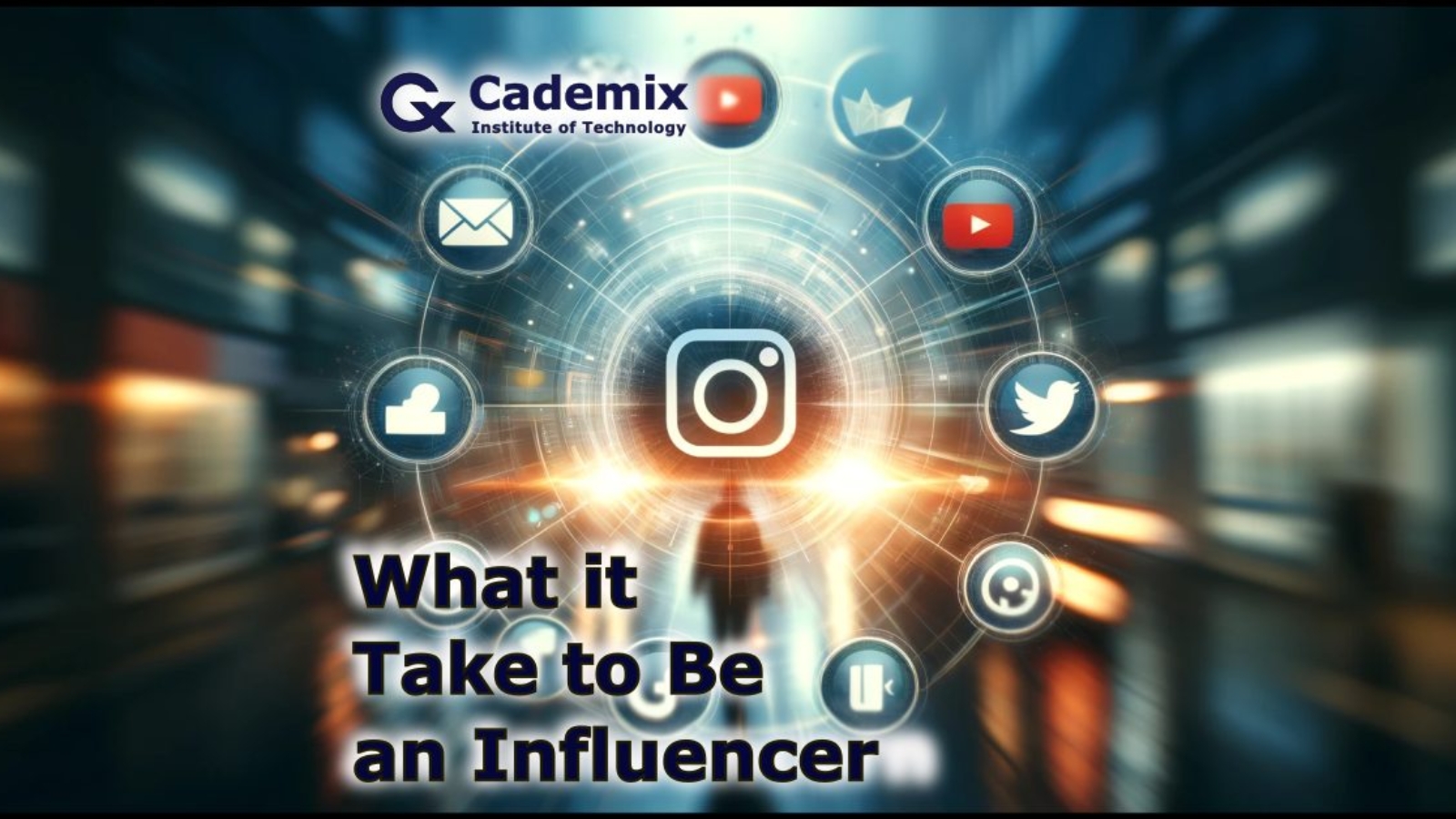In today’s digital marketing realm, influencers play a vital role. This article, “Understanding the Influence: Becoming an Influencer,” delves into their multifaceted nature, covering their duties, defining qualities, and steps to attain influencer status. We discuss key traits like creativity, engagement, and authenticity, essential for building a strong personal brand and connecting with followers. Practical advice is provided, including leveraging social media, content, SEO, and analytics. With successful case studies, it’s a guide for navigating influencer marketing, stressing strategic planning and genuine audience engagement for success.
By Samareh Ghaem Maghmami, Associate Technical and Interior Designer at Cademix Institute of Technology | Austria
Introduction
In today’s digital age, the concept of influence extends far beyond traditional advertising; it has become a cornerstone of contemporary marketing strategies across the globe. “Influencer” is a term that has evolved significantly, resonating across social media platforms and redefining how brands connect with consumers. At its core, an influencer is someone who has the power to affect the purchasing decisions of others because of their authority, knowledge, position, or relationship with their audience. This article, “Understanding the Influence: What It Takes to Be an Influencer,” delves into what it truly means to hold this sway in the digital realm.
Influencers play a pivotal role in shaping public perception and consumer behavior, from crafting engaging content to brand collaborations. However, becoming an influencer entails more than just gaining followers; it requires a deep understanding of market dynamics, digital strategies, and authentic audience connections. This exploration will reveal the roles, qualifications, and steps needed to succeed in this competitive field. Whether you’re a beginner or experienced marketer, this guide offers valuable insights into strategic maneuvers and personal branding efforts for success.

Defining the Role of an Influencer
At its most fundamental level, an influencer is someone who holds the capacity to impact the opinions, behaviors, and purchasing decisions of others. This influence is predominantly wielded through platforms such as Instagram, YouTube, TikTok, and blogs, where content is king and engagement is the currency. Influencers differ from traditional celebrities in that their influence is often built on a foundation of perceived expertise, authenticity, and a highly personalized connection with their followers.
Content Creation: The primary role of an influencer is to create content that resonates with their audience. This could range from daily vlogs and stylized Instagram posts to in-depth tutorials and engaging tweets. The content not only needs to be visually appealing and engaging but also tailored to meet the interests and needs of their followers.
Brand Collaborations: Influencers often collaborate with brands to create sponsored content. These partnerships must align with the influencer’s personal brand and audience preferences to maintain credibility. Successful collaborations provide mutual benefits: brands gain exposure and credibility by associating with a trusted figure, while influencers receive compensation and opportunities for growth.
Community Engagement: Influencers thrive by building and maintaining a robust and active community. This involves interacting with followers through comments, messages, and live streams, fostering a sense of belonging and loyalty. Engagement is a two-way street that reinforces the influencer’s authenticity and keeps the audience invested in their narrative.
Influencer as a Marketer: Beyond individual content creation and community engagement, influencers must master the art of digital marketing. This includes understanding the algorithms of social media platforms, utilizing SEO strategies to maximize visibility, and analyzing engagement data to optimize future content. Influencers are, in essence, niche marketers focused on very specific demographics.
The role of an influencer is complex and multi-dimensional. It requires a blend of creativity, marketing acumen, and interpersonal skills. Influencers are not just content creators but also brand ambassadors and community leaders whose influence can drive real-world outcomes. This unique position makes them invaluable in the digital marketing ecosystem, where authentic connections and targeted messaging reign supreme
The True Essence of Being an Influencer
Understanding the true essence of being an influencer involves recognizing the profound impact these individuals can have on marketing strategies, brand perceptions, and consumer behaviors. The core of influencer success lies not merely in the superficial metrics of likes and follower counts but in the authentic connections and trust built with an audience. This deep influence is what differentiates a genuine influencer from a mere social media celebrity.
Authenticity and Trust: The backbone of any influencer’s effectiveness is their authenticity. Influencers resonate with their audience because they present themselves as genuine and relatable, often sharing personal stories, struggles, and successes. This authenticity fosters trust, which is critical in influencer marketing. When followers believe in the influencer’s sincerity, they are more likely to trust their recommendations and opinions. This trust is a powerful tool in digital marketing, where consumers are often skeptical of traditional advertising.
Influencer Impact on Consumer Decisions: Influencers have the unique ability to sway consumer decisions. This can range from influencing the latest fashion trends to shaping perceptions about health and wellness products. The trust and authority that influencers build up over time empower them to act as both trendsetters and trusted advisors, making them key players in marketing strategies.
Strategic Content and Marketing Alignment: Successful influencers know that their content must do more than just entertain; it must align with broader marketing goals and strategies. This alignment involves a sophisticated understanding of digital marketing dynamics, including SEO marketing, content marketing, and social media marketing. Influencers contribute to lead generation and brand growth by creating content that not only engages their audience but also boosts online visibility through strategic keyword integration and SEO practices.
Evolving with Digital Trends: To maintain their status, influencers must stay abreast of changing digital trends and platform algorithms. This includes adapting their content and engagement strategies to fit new digital marketing trends and technologies. Whether it’s leveraging the latest features on social media platforms or employing cutting-edge email marketing techniques, influencers must continually evolve to keep their influence effective and relevant.
In essence, the true meaning of being an influencer extends beyond the ability to attract a large following; it involves the capacity to genuinely connect with an audience, build lasting trust, and strategically leverage this influence to drive marketing initiatives. By integrating marketing strategies with personal branding, influencers play a crucial role in bridging the gap between brands and consumers in the digital age.

The Universality of Influence
The democratization of digital platforms has sparked a widespread debate: Can anyone become an influencer? While the barriers to entry are lower than ever, becoming a successful influencer involves more than just setting up a social media account. It requires a strategic approach to content creation, audience engagement, and brand alignment, all tailored to the unique dynamics of online marketing.
Accessibility and Inclusivity of Digital Platforms: Today, platforms like Instagram, YouTube, TikTok, and blogs offer unprecedented access to potential influencers from all walks of life. These platforms are inclusive, providing a stage for diverse voices and niches, from fashion and beauty to eco-design and sustainability. This inclusivity encourages individuals with unique perspectives or specialized knowledge to build their own space within the digital landscape.
Skill Sets Required for Influencing: While theoretically, anyone can attempt to become an influencer, those who succeed typically possess a specific set of skills. Effective communication, creativity, consistency, and an understanding of digital marketing principles are crucial. Influencers must be adept at SEO marketing to enhance their online visibility, engage in affiliate marketing to monetize their influence, and employ email marketing strategies to maintain direct contact with their audience.
Strategic Content Development: The content an influencer produces must resonate deeply with their target audience to foster engagement and loyalty. This requires a keen understanding of audience needs and preferences, as well as the ability to produce high-quality, relevant content consistently. Strategic content development also involves leveraging keywords and SEO practices to ensure that the content reaches a wider audience, driving lead generation and online marketing success.
The Reality of Influencer Marketing: Not everyone who tries will become a successful influencer. The market is highly competitive, and distinguishing oneself requires a combination of personal charisma, marketing acumen, and the ability to adapt to rapidly changing digital trends. Aspiring influencers must also navigate the complexities of network marketing and influencer marketing platforms, which can be daunting without the right knowledge and skills.
While the opportunity to become an influencer is available to many, achieving true influencer status demands a comprehensive approach to digital marketing, content creation, and audience engagement. It involves a continual learning process and a strategic understanding of marketing dynamics, ensuring that every post and interaction contributes effectively to building a powerful and influential online presence
Qualifications for Becoming an Influencer
To become an influencer, specific qualifications can significantly enhance one’s likelihood of success. While there are no formal educational requirements, a combination of skills, personal traits, and strategic understanding of marketing principles is essential. This section explores what qualifies someone as an influencer, emphasizing the necessary attributes and skills that contribute to effective and impactful influencing.
Key Personal Attributes:
- Authenticity: Authenticity is crucial for building trust and credibility with an audience. Influencers who are genuine and transparent in their interactions and content creation are more likely to establish strong, lasting relationships with their followers.
- Charisma and Engaging Personality: A charismatic personality can captivate an audience, making content more engaging and relatable. Charisma is often what differentiates one influencer from another in a crowded market.
- Adaptability: Given the fast-paced nature of digital media, the ability to adapt to new trends, platforms, and audience preferences is critical for sustained success.
Essential Skills
- Content Creation Skills: High-quality, compelling content is the foundation of influence. Skills in video production, photography, writing, and editing are invaluable.
- Digital Marketing Knowledge: Understanding digital marketing strategies—including SEO marketing, content marketing, and social media marketing—is vital. Influencers must know how to optimize their content for search engines, utilize effective hashtags, and engage with algorithms favorably to increase their visibility.
- Communication Skills: Effective communication with both brands and followers is essential. This includes negotiating contracts, presenting oneself professionally, and interacting with followers in a meaningful way.
Strategic Marketing and Branding:
- Personal Branding: Developing a strong, recognizable personal brand that resonates with a specific audience is essential. This involves consistent messaging, visual style, and tone across all content.
- Network Marketing: Successful influencers often leverage their networks to expand their reach and influence. This includes collaborating with other influencers, participating in community events, and engaging with followers regularly.
- Influencer Marketing Platforms: Utilizing influencer marketing platforms can help in connecting with brands that align with the influencer’s niche and values, facilitating mutually beneficial partnerships.
Analytics and Adaptation:
- Analytical Skills: Being able to interpret engagement metrics and analytics allows influencers to refine their strategies and improve content performance. Understanding what content works best and why it engages an audience can significantly boost an influencer’s effectiveness.
- Feedback Incorporation: Listening to audience feedback and adapting content accordingly is a crucial part of growth and improvement in the influencer space.
In sum, becoming an influencer requires more than just the desire to be seen and heard. It demands a multifaceted approach encompassing personal charisma, strategic marketing, continuous learning, and a deep understanding of digital marketing dynamics. Those aspiring to this role must cultivate a comprehensive skill set and remain agile in an ever-evolving digital landscape.
Prerequisites for Influencer Status
Achieving influencer status is not just about gaining followers but involves meeting several prerequisites that ensure effectiveness and sustainability in the role. This section outlines the essential requirements and strategic steps aspiring influencers must consider to establish and maintain a successful online presence.
Building a Solid Foundation:
- Defining a Niche: To stand out in the crowded influencer marketplace, it’s crucial to choose a niche that aligns with one’s passions and expertise. This focus helps in creating more targeted and meaningful content, enhancing engagement with a specific audience segment.
- Consistent Branding: Consistency in messaging, aesthetics, and content delivery builds brand recognition and helps in maintaining a loyal follower base. Consistent branding across all platforms reinforces an influencer’s professional image and aids in digital marketing effectiveness.
Technical Skills and Tools
- Mastering Social Media Platforms: Proficiency in using and optimizing various social media platforms is essential. Each platform has its unique features and audience, and understanding the best practices for platforms like Instagram, TikTok, or YouTube is critical for maximizing reach and engagement.
- Utilizing SEO and Content Marketing Techniques: Influencers need to employ SEO strategies to ensure their content is discoverable. This includes optimizing post descriptions, using relevant keywords, and understanding SEO marketing trends to increase organic reach.
- Digital Marketing Tools: Familiarity with digital marketing tools and analytics software helps influencers track their performance and optimize their content strategy based on data-driven insights.
Engagement and Growth Strategies
- Active Community Engagement: Building a rapport with followers through regular interaction, responding to comments, and engaging in conversations is essential. High engagement rates not only boost an influencer’s visibility but also attract potential brand collaborations.
- Collaborations and Networking: Networking with other influencers and brands can lead to collaborative opportunities that expand reach and credibility. Effective network marketing strategies are vital for growth and establishing a presence in the influencer community.
- Content Diversification: Expanding content to include blogs, podcasts, or even email newsletters can help influencers reach wider audiences. Email marketing campaigns keep followers engaged and informed, providing value beyond social media.
Ethical and Legal Considerations
- Transparency with Audiences: Adhering to advertising guidelines and being transparent about sponsored content are legal necessities that also foster trust and integrity.
- Understanding Copyrights and Contracts: Knowledge of intellectual property rights, copyright laws, and the details of contractual agreements with brands protects both the influencer and their content.
Long-Term Sustainability
- Continuous Learning and Adaptation: The digital landscape is ever-evolving, and staying updated with the latest trends, platform updates, and marketing techniques is necessary for long-term success.
- Personal Development: Influencers must continually refine their skills, from public speaking to writing, to enhance their influence and maintain relevance in a competitive field.
In conclusion, becoming an influencer involves a mixture of strategic planning, technical proficiency, and ongoing engagement with both followers and industry trends. By meeting these prerequisites, individuals can build a lasting and influential presence within the digital marketing ecosystem, leveraging opportunities for personal growth and professional success.
Recognizing Influencers
Identifying who qualifies as an influencer in the crowded digital space is crucial for brands, marketers, and audiences alike. This section explores the criteria that help define an individual as an influencer, emphasizing the importance of engagement rates, follower count, and niche authority in the influencer marketing ecosystem.
Core Criteria for Recognizing Influencers:
- Follower Count and Reach: While the number of followers is often the first metric noticed, it’s not the only indicator of influence. High follower counts can signify potential reach, important for brand collaborations looking to maximize exposure.
- Engagement Rate: More critical than sheer numbers is an influencer’s engagement rate, which measures how actively involved the audience is with the influencer’s content. High engagement rates indicate that the audience is responsive and values the influencer’s content, making engagement a key metric for both brands and influencer credibility.
- Quality of Content: The quality and consistency of content are vital for maintaining influence. Influencers are expected to produce original, engaging, and high-quality content that resonates with their audience and stands out in a saturated market.
Strategic Importance in Digital Marketing
- Niche Authority: Influencers who are considered authorities in specific niches often wield more significant influence within those areas. Brands look for influencers who can authentically advocate for their products or services to a dedicated and relevant audience.
- Brand Alignment: Successful influencers align closely with the brands they promote, ensuring that their endorsements feel natural and genuine. This alignment increases the effectiveness of digital marketing campaigns, as audiences perceive the influencer’s recommendations as trustworthy.
- Social Media Savvy: Mastery of social media tools and platforms is essential for influencers. This includes understanding the nuances of content delivery on each platform, optimizing posting times, and using analytics to gauge content performance.
Influencer Impact
- Driving Trends: Influencers often play a crucial role in setting and spreading trends across industries. Their ability to affect sales, popularize products, and create media buzz makes them integral to modern marketing strategies.
- Conversion Power: Beyond raising awareness, effective influencers have the power to drive actions, from influencing purchase decisions to encouraging participation in social causes. Their endorsement can translate directly into increased sales and enhanced brand visibility.
Measurement Tools and Analytics
- Analytics Software: Utilizing advanced analytics tools allows influencers and marketers to measure impact accurately. These tools track everything from engagement rates to conversion metrics, providing data that helps refine marketing strategies.
- SEO and Online Visibility: Influencers contribute to a brand’s online visibility through strategic use of SEO practices. By incorporating relevant keywords, hashtags, and content strategies, influencers help brands perform better in search engine rankings.
Recognizing an influencer involves looking beyond the superficial aspects of social media presence to understand the depth of engagement, quality of content, and strategic value they bring to the digital marketing table. As the digital landscape evolves, the criteria for recognizing influencers may shift, but the fundamental aspects of influence—authenticity, engagement, and strategic alignment—remain paramount. This understanding is crucial for brands looking to leverage influencer marketing effectively and for individuals aspiring to make a genuine impact in the influencer space.

Examples of Successful Influencers
Understanding what makes an influencer successful can be best illustrated through real-world examples. This section highlights several influencers who have mastered the art of digital and social media marketing, demonstrating effective strategies across various platforms. These case studies provide insight into how influencers achieve significant impact and maintain relevance in their respective niches.
Case Study 1: The Fashion Influencer
- Profile: A fashion blogger known for her unique style and keen eye for trends, leveraging Instagram and Pinterest to showcase her fashion picks.
- Success Factors: High-quality visual content, consistent posting schedule, and strong engagement with followers through comments and stories.
- Strategies: Collaborations with fashion brands for affiliate marketing, use of targeted hashtags to increase visibility, and regular updates on upcoming trends, contributing to her authority in the fashion industry.
Case Study 2: The Tech Gadget Reviewer
- Profile: A YouTube influencer who specializes in tech gadgets, offering in-depth reviews and tutorials.
- Success Factors: Detailed video content that provides valuable information, engagement through Q&A sessions, and partnerships with tech companies.
- Strategies: SEO-optimized video titles and descriptions to attract tech enthusiasts, use of email marketing to notify subscribers of new content, and leveraging YouTube’s recommendation algorithm to expand reach.
Case Study 3: The Wellness Coach
- Profile: A wellness coach who uses Instagram and a personal blog to share tips on healthy living, mental health, and fitness.
- Success Factors: Authentic content that resonates with health-conscious individuals, interactive posts such as live workouts, and a well-maintained blog with comprehensive articles.
- Strategies: Integration of keywords related to health and wellness in her blog for SEO, partnerships with health food brands, and regular engagement with her audience to foster a community feel.
Case Study 4: The Eco-friendly Advocate
- Profile: An influencer focused on sustainability and eco-friendly living, utilizing platforms like Instagram and a dedicated podcast to spread awareness.
- Success Factors: Educative content that promotes environmental awareness, use of storytelling to share personal experiences with sustainability, and strong community engagement.
- Strategies: Collaborations with eco-friendly brands, use of social media to amplify reach, and podcasts that delve deeper into topics for engaged listeners.
Case Study 5: The Home DIY Expert
- Profile: A DIY enthusiast who shares home improvement projects on TikTok and a DIY-focused blog.
- Success Factors: Engaging and informative video tutorials, high engagement through DIY challenges, and a blog that offers step-by-step guides.
- Strategies: Leveraging TikTok’s viral potential through creative content, optimizing blog posts for SEO with DIY keywords, and affiliate marketing with home improvement brands.
These influencers exemplify the diverse approaches to building a successful personal brand and a loyal following. They combine creativity, strategic marketing, and genuine interaction with their audience, utilizing a mix of content creation, SEO, and social media marketing. Each demonstrates how targeted efforts tailored to specific platforms and audiences can result in substantial influence and marketing success.
Getting Started as an Influencer
Embarking on a career as an influencer requires strategic planning and a deep understanding of digital marketing fundamentals. This section provides a step-by-step guide on how to get started in the influencer world, focusing on building a robust online presence and effectively engaging with an audience. Each step is designed to maximize the potential of becoming a successful influencer by leveraging key digital marketing strategies and tools.
Step 1: Identify Your Niche
- Focus: Select a niche that aligns with your passions and where you can offer unique insights or content that is not widely available.
- Importance: A well-defined niche helps differentiate you from other influencers and attracts a dedicated audience interested in specific topics.
Step 2: Develop Your Brand
- Focus: Create a strong personal brand that reflects your values and the unique angle you bring to your niche.
- Importance: A consistent and recognizable personal brand is crucial for building trust and recognition in the digital space.
Step 3: Optimize Your Social Media Profiles
- Focus: Set up professional and engaging social media profiles across suitable platforms to reach your target audience.
- Importance: Optimized profiles with clear, engaging bios and visually appealing images help in attracting and retaining followers.
Step 4: Create High-Quality Content
- Focus: Produce high-quality content that provides value to your audience, whether it’s educational, entertaining, or inspirational.
- Importance: Quality content is key to engaging an audience and establishing your credibility as an influencer.
Step 5: Engage Consistently with Your Audience
- Focus: Actively engage with your followers through comments, messages, and community posts to build relationships and encourage loyalty.
- Importance: Engagement boosts algorithmic visibility on platforms and helps maintain an active and dedicated follower base.
Step 6: Utilize Analytics to Refine Your Strategy
- Focus: Regularly review analytics to understand what content works, identify engagement patterns, and adjust your strategy accordingly.
- Importance: Analytics provide crucial insights that can help optimize content and increase reach and engagement over time.
Step 7: Network and Collaborate
- Focus: Collaborate with other influencers and brands to expand your reach and gain credibility within your niche.
- Importance: Networking can lead to new opportunities and increase your influence through association and expanded audience exposure.
Step 8: Stay Updated and Adapt
- Focus: Keep up-to-date with the latest trends in digital marketing and social media to ensure your content and strategies remain relevant.
- Importance: The digital landscape is constantly evolving, and staying informed allows you to adapt and thrive in a competitive market.
Starting as an influencer involves more than just posting content online; it requires a strategic approach to personal branding, audience engagement, and continuous learning. By following these steps, aspiring influencers can set a strong foundation for a successful career, leveraging the power of digital marketing to grow their influence and achieve their goals in the dynamic world of influencer marketing.

Conclusion
As we conclude our exploration into the world of influencers, it’s evident that this role continues to evolve and expand within the digital marketing landscape. Influencers are not just trendsetters and content creators; they are pivotal components of contemporary marketing strategies that connect brands with consumers on a personal and engaging level. This final section reflects on the enduring impact of influencers and anticipates future trends in the influencer marketing industry.
Sustained Growth in Influencer Marketing
Outlook: The influencer marketing industry is poised for continued growth as brands increasingly rely on influencers to reach diversified audiences. The personalized connection influencers establish with followers makes them invaluable for authentic brand storytelling.
Technological Advancements and Influencer Impact
Innovation: Emerging technologies such as AI and machine learning are set to revolutionize how influencers create content and interact with their audience. These tools can help in personalizing content for individual viewer preferences, enhancing engagement rates significantly.
Expansion of Micro and Nano-Influencers
Trend: There’s a growing trend towards leveraging micro and nano-influencers for marketing campaigns due to their higher engagement rates and niche audiences. These influencers often boast greater authenticity and a loyal follower base, making them ideal partners for targeted marketing efforts.
Increased Focus on ROI and Analytics
Measurement: As the influencer marketing space becomes more competitive, there will be an increased focus on measurable returns on investment. Brands will seek more sophisticated analytics tools to quantify the impact of influencer campaigns, ensuring that marketing budgets are spent effectively.
Ethical Marketing and Transparency
- Ethics: Transparency and ethical marketing practices will become even more crucial as consumers grow wary of deceptive advertising practices. Influencers and brands will need to adhere strictly to advertising standards and guidelines to maintain credibility and trust with audiences.
In short, the realm of influencer marketing is dynamic, and constantly influenced by changing consumer behaviors, technological advancements, and evolving marketing strategies. As influencers continue to shape and shift the marketing landscape, their ability to adapt and innovate will determine their success and sustainability. For aspiring influencers, understanding the nuances of digital marketing, engaging authentically with audiences, and staying abreast of industry trends is key to forging a successful and impactful career in this exciting field.
For those looking to dive into the influencer world or enhance their existing strategies, now is the time to harness the power of digital marketing, embrace innovation, and commit to ethical practices to stand out in the bustling influencer marketplace.

About the Author
Samareh Ghaem Maghami is an accomplished professional with a rich background in painting, interior decorating, and event management, currently enhancing her expertise as a master’s student in eco-design at FH Wiener Neustadt. Residing in Austria, Samareh combines her artistic sensibilities with a keen understanding of eco-friendly design principles, making her insights particularly valuable in the realms of creative and sustainable industries. Her extensive experience in practical and executive roles, coupled with her passion for nature and aesthetics, uniquely positions her to offer valuable perspectives on influencer marketing within the eco-design and creative sectors. Connect with Samareh on LinkedIn to discuss potential collaborations or to gain further insights into leveraging influencer marketing strategies in eco-friendly design and related fields.
She is also an Associate Technical and Interior Designer at Cademix Institute of Technology and a member of the Cademix Career Autopilot Program.
Please feel free to contact her under:
E-mail: sam.gh.maghami@gmail.com
E-mail: samareh.ghaem-maghami@cademix.org
LinkedIn: https://www.linkedin.com/in/samareh-ghaem-maghami
Xing: https://www.xing.com/profile/Samareh_GhaemMaghami

